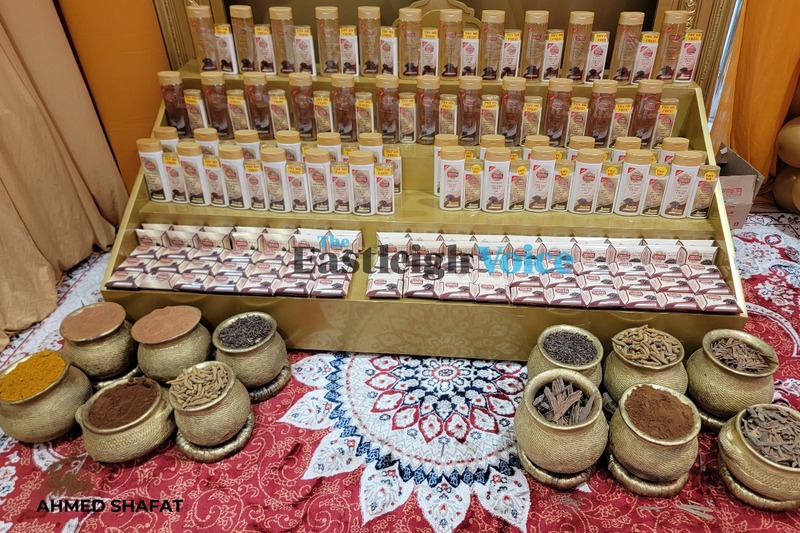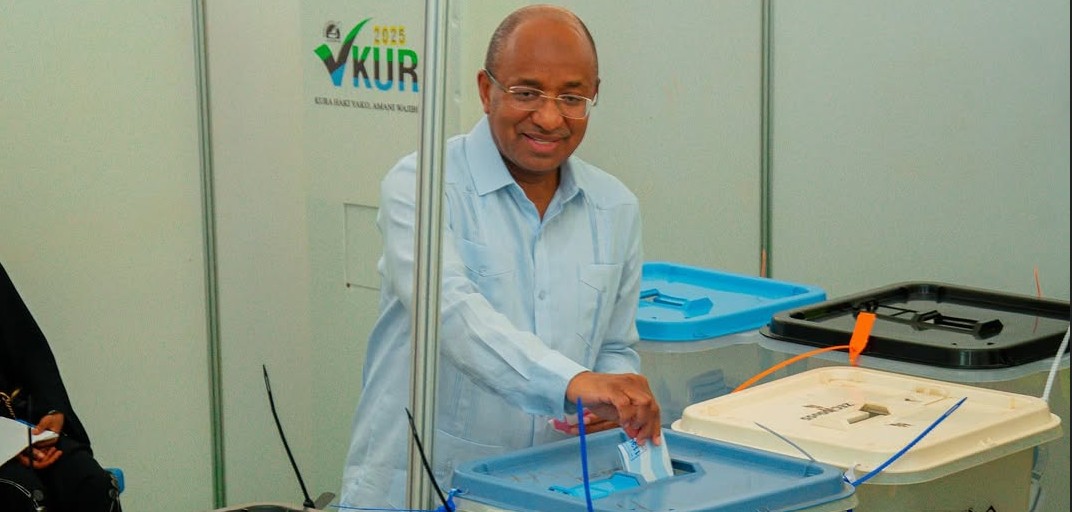Exclusive oud halal products for Muslim women captivate BBS Mall shoppers

Attendees at the event enjoyed music, dance, and complimentary gift packages featuring Sweet Amber and Royal Supreme. Additionally, the women received free henna makeovers, courtesy of PZ Cussons.
The deep appreciation for oud and halal products, especially among women who wear hijab, has inspired one of the largest companies to introduce a special product just for them.
Oud holds a significant place in the lives of many women in the Islamic community, and this new offering is designed to honour and cater to that cherished tradition.
More To Read
- Muslim ritual meets Swahili culture at Kenya’s unique annual Maulidi festival
- Halal business workshop seeks to drive growth in East Africa
- From fruit vendors to matatu drivers: Meet the people keeping Eastleigh alive
- Homemade corn dogs gain popularity with halal food lovers
- Why Eastleigh is Nairobi’s economic powerhouse: Stories of hustle, culture and community
- Eastleigh booms as East Africa’s borderless marketplace, drawing diverse traders and entrepreneurs
Today, BBS Mall was abuzz with excitement as Somali women and other residents flocked in to explore PZ Cussons, the newly launched Imperial Leather oud range.
Oud, also known as agarwood, is a highly valued and aromatic wood that is used to produce essential oils. This oil has a rich, complex fragrance and is often used in perfumes, incense, and traditional medicine.
Sekar Ramamoorthy, the Managing Director of PZ Cussons for Kenya and Ghana, shared his inspiration behind the collection. He talked about how a trip to the coastal region deeply influenced his team, with its captivating, sweet fragrances serving as the muse for this exclusive oud range.
“Made from the oils extracted from this special tree via a complex and unique natural process, oud has been used as medicine, incense, and aromatic oils for thousands of years and remains highly valued for its rich, sweet, woody, aromatic and complex scent,” said Sekar.
Sekar outlined their goal of targeting Kenya's expanding market of nearly six million Muslims, which is projected to grow to eight million by 2030. He highlighted that Halal products and oud are not only of interest to the Muslim community but also attract non-Muslim consumers.
Silas Ouko, the Brand Manager for PZ Cussons, emphasises that the development of their product was guided by consumer insights. He explains that oud is of considerable cultural and social significance for Muslims and Somalis, who commonly use it in various contexts.
“Oud, being a natural and costly fragrance, is often blended with other elements. Observing the tendency to mix oud with flowers and spices inspired our product line. This led us to create offerings like Royal Supreme, which combines cinnamon and cloves, and Sweet Amber, which features jasmine along with oud, blending these elements into our unique products.”
In the Muslim community, oud is valued for more than just its fragrance; it also holds medicinal and therapeutic significance. Some of its functions include:
Cultural and Religious Practices: Oud is frequently burned during special occasions, religious ceremonies, and social gatherings. Its fragrant smoke is believed to purify spaces and enhance spiritual experiences.
Personal Fragrance: Oud is a popular choice for personal scent in Somalia. The rich, woody aroma is considered sophisticated and is a marker of elegance and status.
Social and Ceremonial Gifts: Oud is often given as a gift during important events like weddings, celebrations, or as a token of respect. Its value and unique scent make it a prestigious and thoughtful present.
 Eastleigh residents attending the launch at BBS Mall. (Ahmed Shafat)
Eastleigh residents attending the launch at BBS Mall. (Ahmed Shafat)
Halal standards
The launch was graced by Dr Fatuma Hirsi, a former principal secretary for the ICT and Tourism ministries and a Certified Executive Coach, who highlighted the urgent need for Kenya to establish official Halal standards and certification for personal care and beauty products.
“Halal consumption has become a lifestyle and culture of Muslim communities in various parts of the world. This is because it fulfils the demands of Islamic religious law and is reflected in the phenomenon of consumers choosing halal food, wearing Muslimah clothes, recreating in Muslim-friendly destinations, or transacting using Sharia-compliant products,” Dr Hirsi stated.
She highlighted the importance of companies like PZ Cussons reaching out to Muslim consumers, noting that "Muslims prefer to use Halal products, making Halal certification crucial as it aligns with their religious obligations."
Dr Hirsi also pointed out that the buying power of Muslim women is increasing, and it is essential to tailor products to meet their needs.
“Kenya’s regulators will need to align with international standards, promote Halal certification, and ensure consistent labelling and monitoring to build consumer trust and expand market access,” she said.
“This calls for investment in continuous product monitoring, heightened vigilance, embracing a dynamic regulatory approach, periodic ingredient reviews, a centralized product approval system, and alignment with global manufacturing standards,” she added.
She highlighted that Muslim women are very particular about the products they use and tend to avoid those that are not Halal. Therefore, PZ Cussons' decision to step forward and offer Halal-certified products is crucial for meeting the community's needs.
A Halal product adheres to Islamic law and principles as outlined in the Quran and Hadith. The term "Halal" means "permissible" or "lawful" in Arabic, and it applies to various aspects of life, including food, drink, personal care products, and more.
 Herbs and imperial lather oud range products show cased at the BBS Mall. (Ahmed Shafat)
Herbs and imperial lather oud range products show cased at the BBS Mall. (Ahmed Shafat)
Here are the key characteristics of Halal products:
Food and Beverages: Halal food and drinks are those that are permissible under Islamic dietary laws. The food does not contain ingredients that are Haram (forbidden), such as pork or alcohol.
Animals are slaughtered according to Islamic guidelines, known as Zabiha, which involves a specific method of slaughter and invoking the name of God.
Personal Care Products: Halal personal care products, such as cosmetics and toiletries, must be free from Haram ingredients. These products should not contain animal-derived ingredients that are not Halal, such as certain types of gelatin or fats, and must be manufactured in a way that avoids contamination with Haram substances.
Pharmaceuticals and Supplements: Halal pharmaceuticals and dietary supplements are those that do not include Haram ingredients or substances derived from animals not slaughtered according to Islamic law.
Ethical and Hygienic Considerations: Halal products are also expected to be produced and processed in a manner that adheres to ethical and hygienic standards, aligning with Islamic principles of cleanliness and fairness.
Certification: Many Halal products are certified by recognised Halal certification bodies, which verify that the products meet all the requirements and standards. This certification often involves a thorough review of ingredients, production processes, and facilities.
Attendees at the event enjoyed music, dance, and complimentary gift packages featuring Sweet Amber and Royal Supreme. Additionally, the women received free henna makeovers, courtesy of PZ Cussons.
Top Stories Today












































